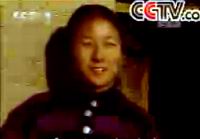 In 1989, Kang Jianning, a documentary director, entered a farmer’s home in the depth of the desert and began to videotape their life, ideas and conditions. At the same time, Gao Guodong, another director, videotaped the story of a fisherman’s family on the Liaodong Peninsula. Their documentary film “The Sand and the Sea” gained a grand prize of ABU (Asian Broadcasting Union) for the 28th awards. It was the first Chinese TV documentary that won an international grand prize. This year, Kang Jianning entered the desert for the fifth time. In 1989, Kang Jianning, a documentary director, entered a farmer’s home in the depth of the desert and began to videotape their life, ideas and conditions. At the same time, Gao Guodong, another director, videotaped the story of a fisherman’s family on the Liaodong Peninsula. Their documentary film “The Sand and the Sea” gained a grand prize of ABU (Asian Broadcasting Union) for the 28th awards. It was the first Chinese TV documentary that won an international grand prize. This year, Kang Jianning entered the desert for the fifth time.
Liu Zeyuan and his family lived in the depth of the sparsely populated Tengger Desert. He depended on the desert all his life. He hoped that he could get along with his sons and daughters, leading a peaceful life, but his children had their own ideas. The documentary “The Sand and the Sea” demonstrates the varied conditions of the desert and displays the profound sentiments of man with nature.
Liu Zeyuan and his family have lived here for more than 20 years. This place lies in the Tengger Desert, Alxa League, Inner Mongolia. They graze livestock to make a living. Liu Zeyuan’s main property includes more than 100 sheep and more than 20 camels. He has three sons and two daughters. He is not a native. His ancestral home is in Minqin County, Gansu Province on the border of the Tengger Desert. He had been a farmer before he came to Inner Mongolia. His land was covered by sand, so he left his old home by himself and came here to have this family.
Not far from Liu Zeyuan’s home is a desert lake. Probably because of this, the groundwater level is pretty high. Liu Zeyuan dug into the sand for three metres and he got a well.
Before he died, Liu Zeyuan was allotted 13 mu of land, nearly one hectare. Because the land is saline and arid, it cannot serve as the major source of livelihood for the family. Today the eldest son is the owner of the land.
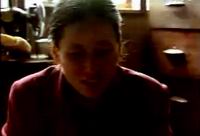 Liu Zeyuan and his family got their income mainly from the sale of wool and cashmere. With this amount of money they bought all the necessaries for life. Liu Zeyuan tried to save the money for buying grain, so he reclaimed wasteland and grew crops. In winter every year, he removed the sand that had covered the land.
Liu Zeyuan and his family got their income mainly from the sale of wool and cashmere. With this amount of money they bought all the necessaries for life. Liu Zeyuan tried to save the money for buying grain, so he reclaimed wasteland and grew crops. In winter every year, he removed the sand that had covered the land.
After Liu Zeyuan died, the eldest son left here. Naturally the second son had to inherit Liu Zeyuan’s family property.
When we came here for the first time in 1989, we were most impressed by Liu Zeyuan’s family in two aspects. First, in the depth of the lifeless desert, five sons and daughters led a simple and very orderly life around Liu Zeyuan every day. It seemed that they cared about nothing but weather forecasts. You could hardly have such a feeling elsewhere. When you turned your eyes from them and this small house to any other direction, you felt that the dividing line between life and death was so distinct. Their happy family life was incompatible with the surroundings. Secondly, this special environment had brought people infinite dullness and loneliness.
Liu Zeyuan died in 1996. Since then, this family has remained stable. But his sons and daughters have their own ideas about their long years of life in the desert.
Liu Zeyuan’s eldest son and second son only graduated from the junior high school. Then he sent his youngest son to school. A herdsman’s child could only go to a boarding school. He came back home about once a month. The school is about 30 kilometres away from Liu Zeyuan’s home.
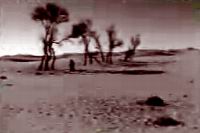 Liu Zeyuan’s youngest son did not have more schooling than his brothers. Like the two of his brothers, he did not do well in his studies. After he graduated from the junior high school, the youngest son came back home and then joined the army. Now he has come back again after two years of service.
Liu Zeyuan’s youngest son did not have more schooling than his brothers. Like the two of his brothers, he did not do well in his studies. After he graduated from the junior high school, the youngest son came back home and then joined the army. Now he has come back again after two years of service.
Liu Zeyuan hopes that his sons will become men who can work hard and endure hardships. In the eyes of others, his sons do not lack this spirit. But Liu Zeyuan believes that it is far from enough. He has his own criterion, that is, the ability to live in the desert and make their life turn for the better. The present conditions of his sons are far from enough.
Liu Zeyuan is really afraid that nobody will inherit the hard-earned family property. He wants his sons and daughters to be stable mentally and most willing to live on here. In other words, they should get married here. Liu Zeyuan believes that if the necessary material conditions are not available, his wishes will come to nothing. He has made up his mind to build a new house, so his sons and daughters will live in bright and spacious rooms. It is a very tough job for Liu Zeyuan and his family to build a house in the desert. All the materials have to be carried here by camels from a place 30 kilometres away.
Liu Zeyuan’s eldest son did not settle down in the new house as his father had expected. He left the desert before Liu Zeyuan died. Fourteen years have gone by. Today such a change seems to be so natural.
Liu Zeyuan’s eldest daughter was married off in 1994. Now she is a farmer in Liujiaxia, Gansu Province.
Liu Zeyuan’s youngest daughter is a third grade junior high school student. Like her three brothers, she is attending the same school 30 kilometres away.
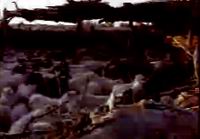 Liu Zeyuan built a new house in more than three years. The new house was the fruit of labour done by the whole family. It is also an important material condition for the desert family to remain here seven years after his death. Probably this was the aim of Liu Zeyuan’s untold hardships.
Liu Zeyuan built a new house in more than three years. The new house was the fruit of labour done by the whole family. It is also an important material condition for the desert family to remain here seven years after his death. Probably this was the aim of Liu Zeyuan’s untold hardships.
Not far from Liu Zeyuan’s home is a lake. Usually the lake contains a limited amount of water, but the surface of the water becomes larger when it rains. Because the water is saline, there is no fish in the lake. In autumn every year, some swans fly there. So it is known as the Swan Lake.
When we came here for the second time, six years had gone by since we came here for the first time in 1989. Liu Zeyuan was visibly older and feebler. Except for the new house, the surroundings had not changed at all.
Liu Zeyuan’s eldest son was 28 years old. He was busy all day long as he had been six years before. To get married was a sign of prosperity for a family here. Liu Zeyuan’s main concern was his eldest son’s marriage.
After serving in the army for three years, Liu Zeyuan’s second son came back home. Liu Zeyuan believed that his second son was his ideal successor. The young man was capable and quick-witted. Although he was not satisfied with the living environment and insisted on leaving this place, Liu Zeyuan always thought highly of him.
As compared with 1989, the living conditions of Liu Zeyuan and his family were much better. But to improve the living conditions was not his basic aim. He believed that in such adverse circumstances, he could only display the economic strength of this family by means of good living conditions. So his sons’ problems of marriage could be solved easily. In the meantime, his family property would naturally be inherited if his sons got married here.
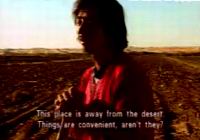 His eldest son was ready to get married, but Liu Zeyuan could not cheer up. This was because his eldest son would not settle down here. His eldest son wanted to go away, and his second son would not remain here. Liu Zeyuan had never expected that before he built the new house.
His eldest son was ready to get married, but Liu Zeyuan could not cheer up. This was because his eldest son would not settle down here. His eldest son wanted to go away, and his second son would not remain here. Liu Zeyuan had never expected that before he built the new house.
Liu Zeyuan had three sons. When we came here for the first time in 1989, his youngest son was at a primary school. Since the two elder brothers were at home, Liu Zeyuan had no other plans for him. Usually he called his second son the youngest son.
Life in the desert is very dull. Even the relationships among the family members are extremely simple. His sons go out to look for the missing camels. They may travel a hundred kilometres for a few days or a month. When they come back, Liu Zeyuan never ask them if they experienced hardships on the way and where they ate and stayed. He believes that all this should be managed by his children, especially his eldest son.
Spring is the grimmest season in the desert. Strong winds come one after another. Even the giant camels are panic-stricken. When a strong wind is over, the most urgent thing for Liu Zeyuan and his family to do is to look for the camels plagued by the wind and sand.
Liu Zeyuan and his family were quite worried about the eldest son’s marriage, because the bride’s family demanded that the new couple should not lead a life of grazing. In other words, they would not live in the new house Liu Zeyuan had built for his eldest son a few years before. They wanted to leave the desert and be farmers elsewhere. This meant that Liu Zeyuan had to build a house for his eldest son outside the desert. Liu Zeyuan’s feelings were mixed. On the one hand, his eldest son’s marriage did not easily come by. If he missed the opportunity, the consequences would be very serious. On the other hand, Liu Zeyuan had two other sons. His youngest son was serving in the army. After he came back, Liu Zeyuan would have to make preparations for the weddings of his second and youngest sons. He could absolutely not bear the economic pressure.
The marriage of his eldest son has not only brought Liu Zeyuan a heavy economic burden. He is deeply disappointed with his eldest son. As the most important labourer of the family, his eldest son used to be with him all the time. Liu Zeyuan hopes that his eldest son will inherit the family property. Now he is getting older and feebler, but his eldest son will leave him. Except his wife, the other members of the family will not continue to live with him in the desert. So the forthcoming marriage of his eldest son is a heavy blow to him.
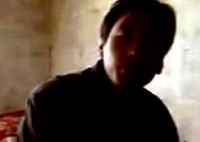 Liu Zeyuan’s eldest son left the desert at last. This place is about 30 kilometres from his old home in the desert. This house was built by Liu Zeyuan especially for his eldest son’s wedding. Today his eldest son is a farmer. Their life has changed tremendously. It has been eight years since Liu Zeyuan passed away.
Liu Zeyuan’s eldest son left the desert at last. This place is about 30 kilometres from his old home in the desert. This house was built by Liu Zeyuan especially for his eldest son’s wedding. Today his eldest son is a farmer. Their life has changed tremendously. It has been eight years since Liu Zeyuan passed away.
I wonder if you are aware that Liu Zeyuan has died when you see this documentary. He is sleeping in the desert not far away. The alternation of the videotapes filmed in a period of 10 years give us a false impression that Liu Zeyuan is still alive. In fact, he passed away not long ago. We can still see his trace from his sons. But television has appeared in their life. This is something many people will not neglect. Perhaps their life will be changed in the not too distant future.
Liu Zeyuan and his family lived in the depth of the sparsely populated Tengger Desert. He depended on the desert all his life. He hoped that he could get along with his sons and daughters, leading a peaceful life, but his children had their own ideas. The documentary “The Sand and the Sea” demonstrates the varied conditions of the desert and displays the profound sentiments of man with nature.
Liu Zeyuan’s eldest daughter got married and left the desert in 1994. Three years later, she was divorced in Alxa League. She came here because she remarried. Now Liu Zeyuan’s eldest daughter lives at a place far away. She has to travel two days by coach and one day by train when she comes back to her parents’ home. She maintains contact with her old home mainly through the post. Letters can only be delivered to the seat of the township. Then one of her family members rides a camel to fetch her letters from there.
There is a lake in front of herdsman Liu Zeyuan’s home. In autumn and winter, some swans often fly to the lake and stay here for some time. Over the past few years, leaders of the township have been planning to turn the lake into a tourist attraction. If the plan is carried out, Liu Zeyuan’s family will have to move away. The plan has been discussed for a long time, but it has not been put into practice. Members of the family are living as usual.
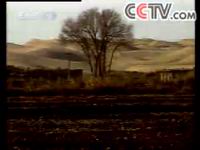 In 1994, Liu Zeyuan’s family was allotted 13 mu of land from the township government. It was almost one hectare. Although the land is on the border of the desert, it is away from the desert. This was an excellent thing for Liu Zeyuan’s family. It happened that his eldest son was going to get married, so Liu Zeyuan let him manage the land. After Liu Zeyuan died, the brothers broke up the family and lived apart. Naturally the eldest son became the master of the land.
In 1994, Liu Zeyuan’s family was allotted 13 mu of land from the township government. It was almost one hectare. Although the land is on the border of the desert, it is away from the desert. This was an excellent thing for Liu Zeyuan’s family. It happened that his eldest son was going to get married, so Liu Zeyuan let him manage the land. After Liu Zeyuan died, the brothers broke up the family and lived apart. Naturally the eldest son became the master of the land.
Many years ago, Liu Zeyuan came here from Gansu Province to do grazing precisely because of the problem of land. His hometown has a large population and little land. Worse still, it is on the border of the desert. Liu Zeyuan had no choice but to leave the land. Through dozens of years of effort, he built up his family property. He believed that so long as he worked hard, he could lead a good life even if he had no land to till. He simply could not understand why his sons and daughters rejected the ideas he had tried to instill into them for dozens of years. He could not understand why his children’s ideas and criterion of life were always different from his.
In fact, after Liu Zeyuan died, the burden of the whole family did not fall on the shoulders of his eldest son, because he had left the desert. It was his second son who began to bear the pressure. Now, he is the true head of the family. During his lifetime, Liu Zeyuan thought most highly of his second son.
Liu Zeyuan’s youngest son was demobilized from the army two years ago. The township government has made a plan for a land development project at a place a hundred kilometres away. It encourages people to stop grazing. He is ready to reclaim wasteland there.
Some narrow-leaved oleaster trees stood not far from Liu Zeyuan’s home. Nobody knew whether they had been planted by men or had grown by themselves. Every year, Liu Zeyuan with his youngest son came to the trees and collected their fruit. The fruit was sweet, but very puckery. Liu Zeyuan said it was too difficult for things to grow on the sand, and it would be a great pity if the fruit was not collected.
When the eldest son left the desert, Liu Zeyuan built this house for him. The life of a farmer was much more stable than that of a herdsman. The eldest son no longer had to worry about how to find camels in the sandstorm. A few years later, he bought a tractor and a motorbike. He had to travel for four hours when he went back home on a camel. Now he can get there in half an hour.
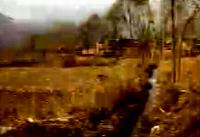 Because according to a plan, this area will be included in a tourist attraction, the township government has been consulting with the Liu family time and again about its resettlement and the cost involved. The sons and daughters of the Liu family agree that if the cost and the site of resettlement are proper, they are willing to leave. But Liu Zeyuan’s wife doesn’t think so.
Because according to a plan, this area will be included in a tourist attraction, the township government has been consulting with the Liu family time and again about its resettlement and the cost involved. The sons and daughters of the Liu family agree that if the cost and the site of resettlement are proper, they are willing to leave. But Liu Zeyuan’s wife doesn’t think so.
Liu Zeyuan died in the winter of 1996 at the age of 57. Before he went to bed in a small inn, he drank a few cups of liquor. He did not get up the next day. He drank liquor probably because he was happy or probably because he was sad. He was accompanying his second son to Zhangjiakou (張家口) to work there. Liu Zeyuan was angry because his sons and daughters were unwilling to live in the desert. In the meantime, he hoped that his children would have splendid prospects. It was really difficult for him to decide what to do for the best. He had been in a dilemma with his eldest son.
Liu Zeyuan’s grave was not located at a site near his home in accordance with the local customs. His eldest son said his father had never left the desert during his lifetime. When his body was buried outside the desert, he could enjoy a little leisure.
This family in the depth of the desert is far from us; it is also near to us. All people are equal in the face of life. The home of Liu Zeyuan and his children in the desert will remain in their hearts for ever no matter whether they stay on in the desert or go away to make a living. I think the wind and sand will remove the traces of their life, but it can never remove their aspirations.
|